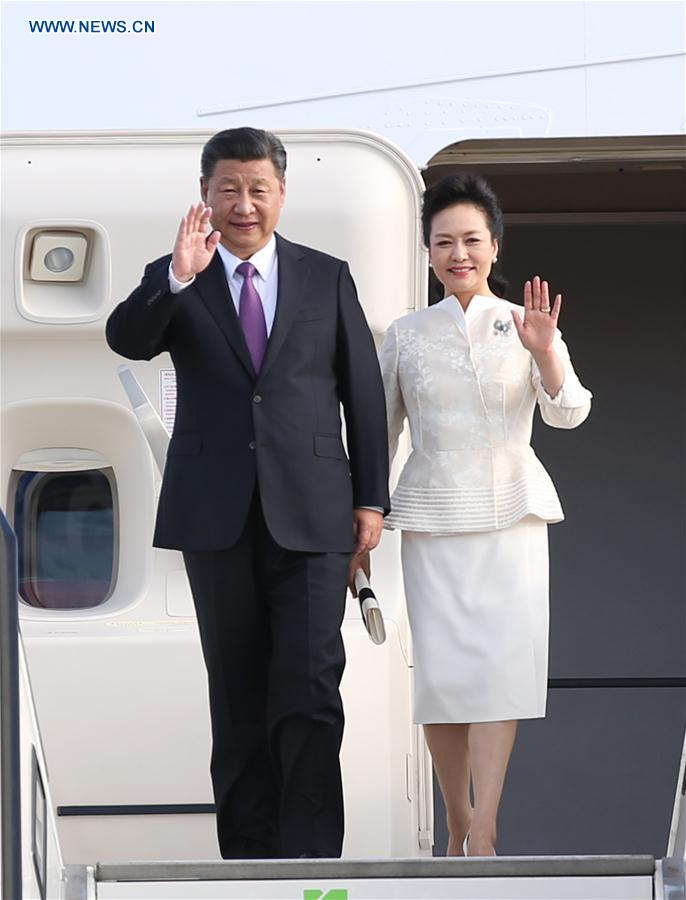Xi arrives in Berlin for state visit to Germany
Chinese President Xi Jinping arrived in Berlin on Tuesday for his second state visit to Germany, aiming to cement ties with this major country of Europe.
|
Chinese President Xi Jinping and his wife Peng Liyuan wave upon their arrival in Berlin, Germany, July 4, 2017. Xi arrived here on Tuesday for his second state visit to Germany. (Xinhua/Yao Dawei) |
During his visit to Germany, Xi will meet with President Frank-Walter Steinmeier and hold talks with Chancellor Angela Merkel. He will also attend the opening ceremony of the Panda Garden at the Berlin Zoo and watch a football match between Chinese and German youth teams.
Xi and German leaders will exchange views on deepening political mutual trust, expanding practical cooperation and reinforcing cooperation within the framework of the Group of 20 (G20) major economies, and discuss other regional and global issues. The two sides will also ink a series of cooperation agreements.
In a written speech released upon Xi's arrival, the Chinese leader said both China and Germany have held fast to the spirit of equality, mutual respect, cooperation and win-win results, and deepened pragmatic cooperation in all areas such as politics, economy, technologies, culture and education, which has led to a steady development in bilateral ties.
"I am delighted to see that cooperation in various areas between China and Germany has been robust because of joint efforts form both sides," he said, noting that bilateral cooperation has delivered real benefits to the two peoples, and played a leading and exemplary role in boosting Europe's cooperation with China and Asia.
He also said China and Germany, both the world's major economies, share not only broad common interests, but also responsibilities to maintain economic globalization and multilateralism, and to contribute to world peace and prosperity.
The year 2017 marks the 45th anniversary of the establishment of China-Germany diplomatic ties. It is expected that Xi's visit will chart the course for the future development of bilateral ties and build new momentum for China-Europe partnerships of peace, growth, reform and civilization, Chinese Vice Foreign Minister Wang Chao told a media briefing on June 29.
During Xi's first state visit to Germany in March 2014, China and Germany lifted their bilateral relations to a comprehensive strategic partnership.
"Today and once again, the China-Germany relationship is standing at a new start point, and facing new opportunities for development," said Xi, adding that he would like to join the German leaders during the visit to fix new targets and set new directions for the development of bilateral comprehensive strategic partnership so as to push bilateral ties further forward.
The Chinese president also said Beijing is ready to work with Berlin so that this year's G20 summit in Hamburg can achieve positive outcomes on the basis of last year's Hangzhou summit and send out a signal that stresses openness, cooperation and all-win situation so as to inject fresh impetus into global economic growth.
The two economies are highly complementary. Bilateral trade volume reached 151.29 billion U.S. dollars in 2016, and China became Germany's largest trading partner for the first time.
As the G20 summit host respectively for 2016 and 2017, China and Germany are both working to contribute to global economic governance.
In an interview with Xinhua, Chinese Ambassador to Germany Shi Mingde said China hopes that the upcoming G20 Hamburg summit will continue to encourage openness of the world economy in a bid to counter protectionism, and push growth through innovation and structural reform, instead of only using fiscal and monetary tools.
The July 7-8 G20 Hamburg summit is expected to focus on issues of global economic growth, trade, spread of digital technology, climate policy and Africa's development, among others.
Germany is the second leg of Xi's European tour which also took him to Russia. During his stay in Germany, Xi will also travel to Hamburg to attend the G20 summit.
